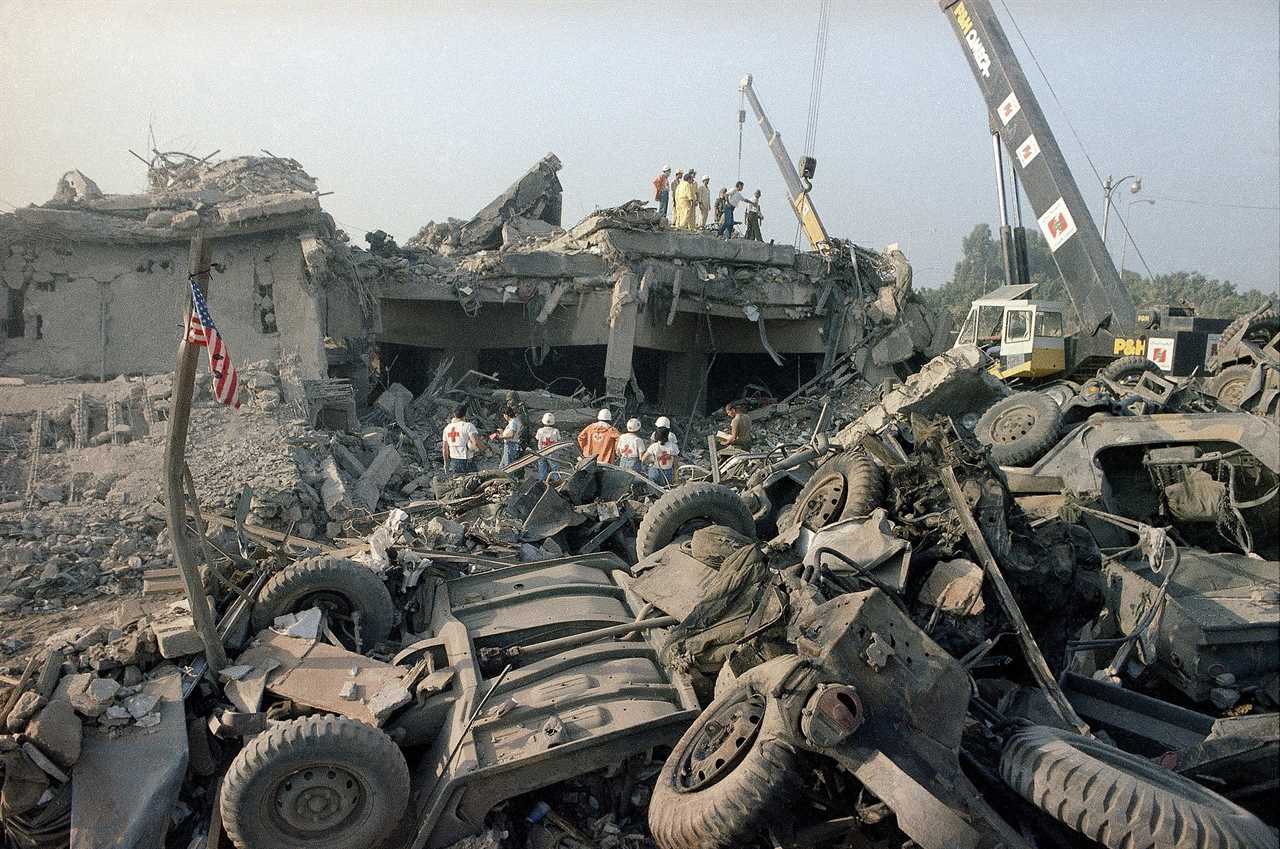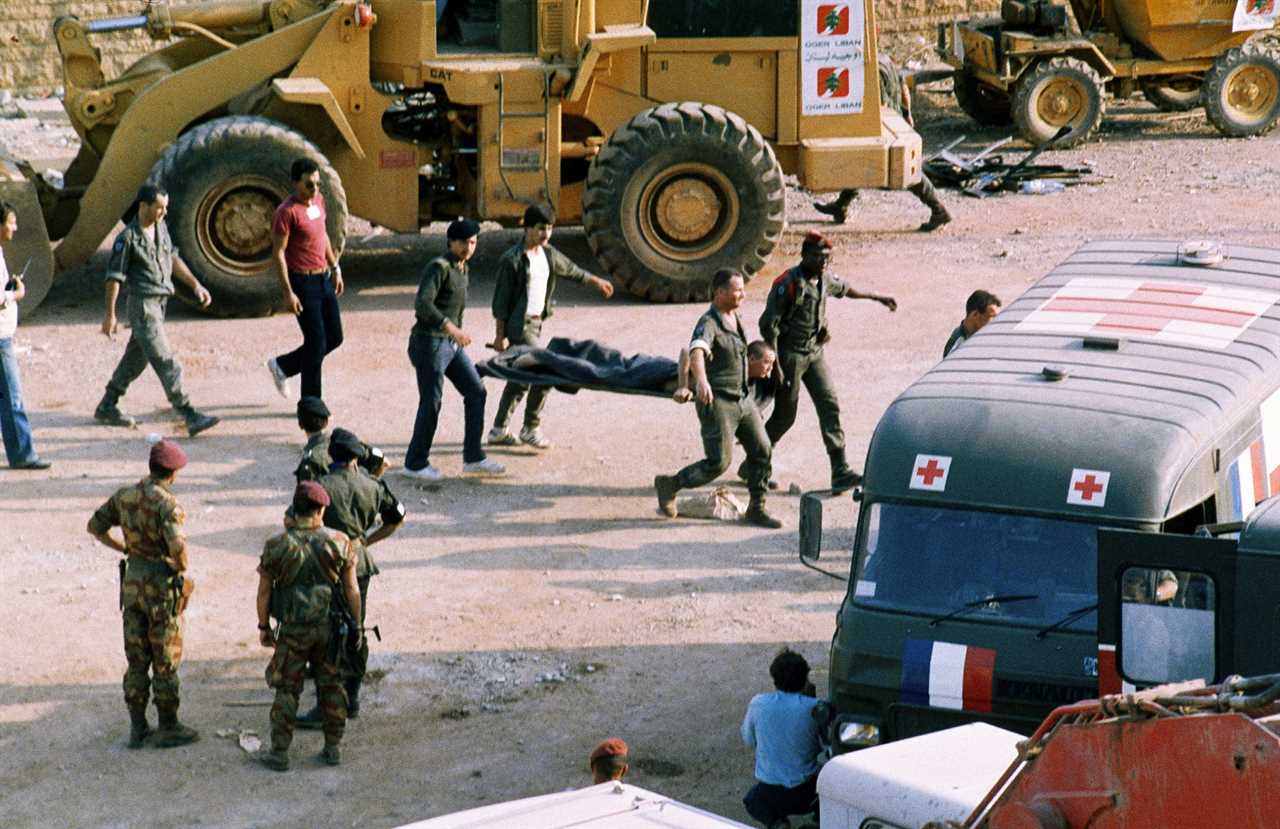AP Photo/Jim Bourdier, File
- On October 23, 1983, 241 US service members were killed in the Beirut barracks bombings.
- Then President Ronald Reagan at the time described the Middle East as a "powder keg."
- Forty years later, the Israel-Hamas war is sparking fears that the Middle East may erupt in conflict.
In the wake of the 1983 Beirut barracks bombing, which took the lives of 241 US service members, then-President Ronald Reagan described the Middle East as a "powder keg." Exactly 40 years later, with Israel's war against Hamas teetering on the edge of exploding into a regional conflict that could pull the US into a fight with Iran or its proxies, his words once again appear to ring true.
At 6:22 a.m. local time on October 23, 1983, a suicide bomber drove a truck packed with explosives into barracks housing US troops at the international airport in Beirut, Lebanon's capital city. The detonation and ensuing blast reduced the entire building to rubble, killing 220 Marines, 18 sailors, and three soldiers, The deadly blast marked the largest single-day loss of life for the Corps since the Battle of Iwo Jima during World War II.
An accompanying attack just a few minutes later on French forces — who, along with the Americans, British, and Italians, had deployed to Lebanon the year prior at the request of the government amid a brutal civil war — killed 58 troops and six civilians.
In a televised address after the dual explosions, President Reagan said the barracks attack was the latest assault against US forces stationed in Lebanon and that he had made efforts to speak with the loved ones of those killed.
"Sometimes, there were questions, and now many of you are asking: 'Why should our young men be dying in Lebanon? Why is Lebanon important to us?'" the former president said at the time.
"Well it's true," he continued, "Lebanon is a small country more than five and a half thousand miles from our shores, on the edge of what we call the Middle East. But every president who has occupied this office in recent years has recognized that peace in the Middle East is a vital concern to our nation and, indeed, to our allies in Western Europe and Japan."

AP Photo/Jim Bourdier, File
"We've been concerned because the Middle East is a powder keg. Four times in the last 30 years, the Arabs and Israelis have gone to war," Reagan added. "And each time, the world has teetered near the edge of catastrophe."
Forty years later, his remarks appear to have come full circle. The Beirut suicide bomber was found to have links to Hezbollah, an Iran-backed militant group that's since been designated as a foreign terrorist organization by the US, and a 2003 court case revealed that Tehran gave the orders. Now there are warning signs that these two entities could jump into the latest spurt of violence to plague the Middle East, where American forces are in position to defend and deter.
Israel and Hamas have been at war for more than two weeks, after the militant group killed at least 1,400 Israelis and injured nearly 5,000 more during a shocking and ruthless massacre earlier this month. The ongoing retaliatory Israeli airstrikes against targets in the Gaza Strip — which appears to be the precursor to a ground invasion of the enclave — have left at least 4,500 Palestinians dead and over 14,000 others injured, according to the latest United Nations figures.
As things stand, the fighting is still largely contained to Israel and Hamas, but there are fears that the conflict could expand into a larger regional war with moments of escalation from Iran-backed groups becoming more frequent and dangerous.
Israeli forces and Hezbollah militants in southern Lebanon have been regularly exchanging fire lately, with officials warning that a second front could open up there. Last week, a US Navy destroyer operating in the Red Sea shot down cruise missiles and drones fired by Iran-backed Houthi militants in Yemen, with a Pentagon spokesperson saying the threats were "potentially" traveling toward targets in Israel. Additionally, US forces in Iraq and Syria have come under frequent drone attacks — activity that's historically been tied to Tehran-supported groups in those two countries.

AP Photo, File
Furthermore, the Middle East has been roiling in unrest in the wake of a deadly explosion at a hospital in Gaza last week, with protests throughout the region fueled by anger toward Israel — which, with US backing, denied responsibility for the incident and blamed the tragedy on a failed Palestinian rocket. Israel presented evidence to support its claims while the US conducted an independent analysis of the situation. Anger, however, remains in the aftermath.
With tensions boiling, Washington is warning Americans throughout the Middle East to exercise caution and remain vigilant. The US embassy in Lebanon said on Sunday that citizens who want to depart the country "should leave now, due to the unpredictable security situation."
In a bid to deter the Israel-Hamas war from expanding and send a message to Iran and its proxies that they should stay away from the conflict, the US military has moved a large amount of combat power to the region over the past two weeks, including to the eastern Mediterranean in waters near Lebanon. This increased American footprint includes aircraft carriers, warships, fighter jets, air-defense capabilities, and personnel.
"Today, we reject, and the Lebanese people reject, the threats of some to drag Lebanon into a new war," US Ambassador to Lebanon Dorothy Shea said in comments marking the barracks bombing anniversary on Monday.
"We continue to renounce any attempts to shape the region's future through intimidation, violence, and terrorism — and here I am talking about not just Iran and Hizballah," she said, using the alternate spelling of Hezbollah, "but also Hamas and others, who falsely paint themselves as a noble 'resistance,' and who most certainly do not represent the aspirations — or the values — of the Palestinian people, while they try to rob Lebanon and its people of their bright future."
Read More
By: [email protected] (Jake Epstein)
Title: 40 years after the Beirut barracks bombing, the US military is again at risk of clashing with the same forces behind it
Sourced From: www.businessinsider.com/us-beirut-barracks-bombing-risk-clash-israel-hamas-hezbollah-iran-2023-10
Published Date: Mon, 23 Oct 2023 16:41:13 +0000
.png)





